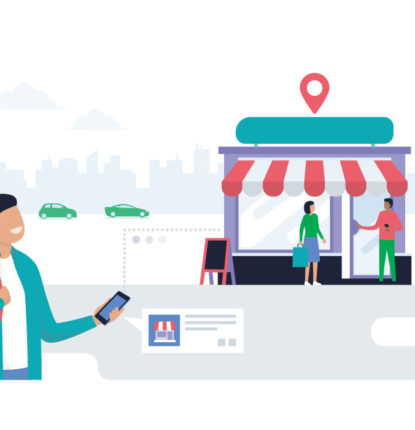
How To Promote Your Local Business Online

Draw in new customers by promoting your local business online.
Whether you are a brick-and-mortar business or a mobile business that serves a particular geographical area, you need more than just a website. You need sound strategies that attract your target audience and keep them coming back for more.
Let’s get started!
Take the Time to Strategize
Google only loves you when everyone else loves you first. — Wendy Piersall
You recognize the necessity of promoting your local business online, now you have to figure out the best way to go about it. You have to train for a race before you push off the starting blocks. Formulate your plan, then implement it, in that order. Begin by answering questions like the following:
- Who is your target audience?
- What’s your budget?
- What are your goals and expectations?
- What are your obstacles?
- What’s realistic?
Outlining a strategy enables you to stay organized, focused, and places you in the best position for success.
A big part of your overall strategy means having a handle on your brand. You want to make sure that all of the digital avenues you choose to showcase your business maintain a consistent brand voice, message, and image that your customers can recognize and depend on.
Leverage Social Media
Just as you don’t need to be on every single TV channel, I don’t believe a brand needs to be on every single social media one in a big way. — Shiv Singh
Social media channels present an opportunity to connect with your local community and build a solid presence.
The more you interact with your customers, potential or otherwise, the more engaged they will feel, which contributes to your authenticity and trustworthiness.
Taking advantage of social media platforms means more than simply having a Facebook page. A multitude of social media channels exist, including Facebook, Instagram, LinkedIn, SnapChat, TikTok, etc.
You need to choose the right channel(s) that fit your needs. Furthermore, you need to remain active on them.
This means making use of both organic posts—such as posting updates directly on a platform like Facebook—and paid advertising—spending a little money to reach your audience through ads on platforms like Facebook.
Here are three components your social media posting strategy should include to promote your local presence.
- Inform: Take the time to post updates, special offers, last minute closures, and other important details.
- Entertain: Echo the emotional investment your community has in local sports teams or other events. Don’t be afraid to showcase a sense of humor if that aligns with your brand voice.
- Give Back: Support local causes. This can mean a fundraiser where a percentage of the proceeds go to support said cause, or where you organize a food drive drop off. Get creative with your altruism!
Use Local SEO
Your ultimate consumers are your users, not search engines. — Google
The saying use to be “location, location, location” but now it should be “proximity, proximity, proximity” to make it more accurate.
Local SEO matters and here is why: 90% of consumers use online searches to find local businesses.
Let’s say someone does a Google search for a dentist. For the sake of this scenario, let’s say you also happen to be a dentist. You want your dental office to come up not only as a top result in the organic search, but also in the Google Map Pack, which provides a list of dentists within close proximity to where the search is being conducted.
To achieve this, you need to make sure you claim your Google listing and update it with the correct information including the name of your business, the address, and the phone number. As part of your local business listing optimization, you want this information to be accurate and consistent across all listings, your website, your social channels, and everywhere it may appear.
Write and Post Blogs
Authenticity, honesty, and personal voice underlie much of what’s successful on the Web. — Rick Levine
Make sure your website provides the answers your audience searches for every day. A blog is not about selling, it is about informing. Starting and maintain a blog on your website serves to:
- Connect with your audience
- Drive traffic to your website
- Establish your brand as an authority
You need to make sure that you update your blog regularly and that your content is written using SEO best practices, including keywords and the geographical location you serve.
Encourage and Interact With Reviews
A brand is no longer what we tell the consumer it is — it is what consumers tell each other it is. — Scott Cook
Word of mouth continues to be an effective way to gain the business of new customers. It isn’t just about telling your friend about a good experience you had, it also exists in the digital space through reviews people leave on places like Google and Facebook. Simply do your job of providing a 5-star service and then follow up by encouraging your happy customers to leave a review. Some may not take the time, but they are more likely to if you make the request upon the time of service. You can even offer an extra incentive like providing a percent off their next purchase with proof of leaving a review.
Make sure you take the time to respond to reviews, especially the bad ones. Unfortunately, people are 2 to 3 times more likely to write a negative review. For some reason as a society, we like to focus on our dissatisfaction instead of giving praise, but psychology aside, your business can still benefit from both. When you take the time to respond to a review, you bolster your authenticity, and you show you care. This also provides the opportunity to transform a bad experience into a great one by offering an incentive to try your product or service again.
Every Aspect of Your Strategy Must Work Together
Keep in mind, the elements of your strategy have to work together. Consumers want a reliable business with positive reviews, located as conveniently as possible to where they are at that moment. People who see you are less than a mile away, have a solid social media presence, feature numerous positive reviews, and a blog that answers their questions will feel confident when they choose to become your customer.
Your Mission Is Our Mission
Ready to scale your digital marketing for success?
We want to hear from you.
Contact us today for a complimentary, customized marketing consultation. Or, just to say hi :)
"*" indicates required fields




